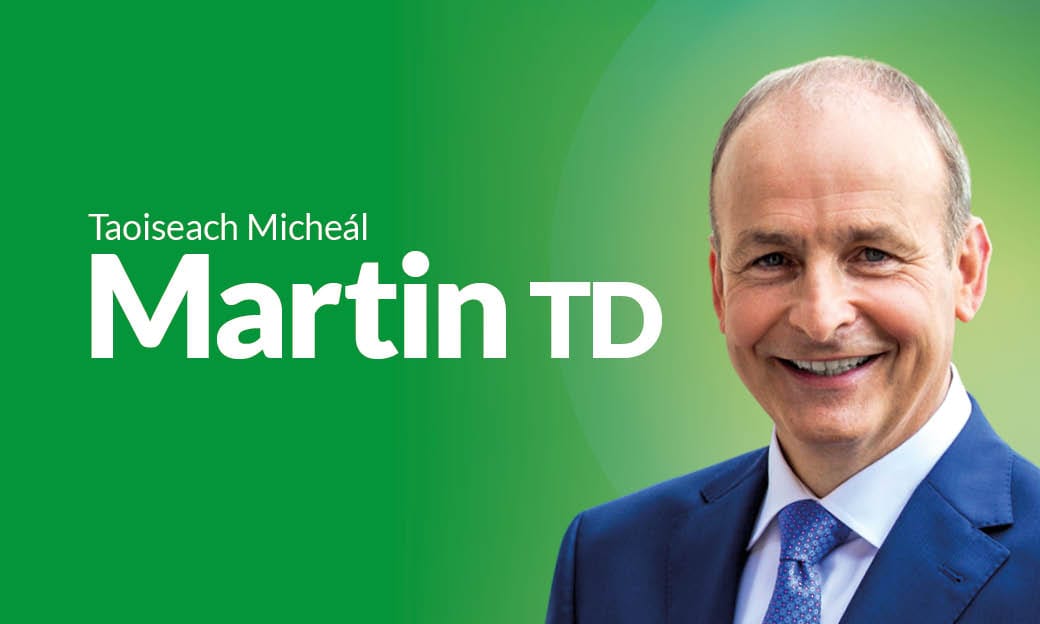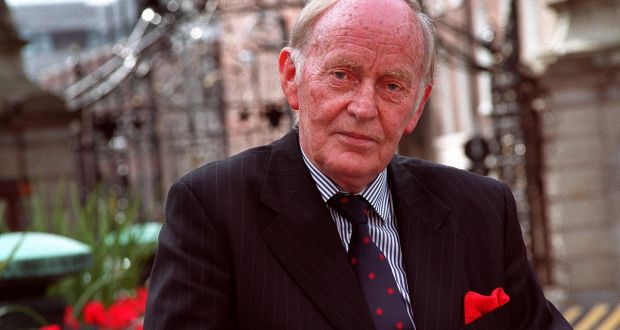Address by Taoiseach Micheál Martin, T.D., at the Centenary Commemoration of the founding of Seanad Éireann Leinster House
Published on: 13 December 2022
A Chathaoirligh;
A Sheanadóirí;
A dhaoine uaisle go léir.
Is pribhléid mhór domsa a bheith anseo libh go léir inniu chun aitheantas a thabhairt do chomóradh céad bliain den chéad chruinniú a bhí ag Seanad Éireann.
Le deich mbliana anuas, eagraíodh clár éagsúil leathan ag comóradh ócáidí agus pearsantachtaí iontacha agus tábhachtacha ag tréimhse lárnach cinniúnach inár stair.
Is den bhfíorthábhacht é ag an am céanna an deis a thapú chum comóradh a dhéanamh ar ár n-institiúidí daonlathacha agus smaoineamh go cruinn ar an ról agus tionchar dearfach a bhí agus atá acu fós ar rath agus dul chun cinn ár dtíre.
Táimid anseo in onóir ár Seanadóirí a thug seirbhís dílis don tír seo ó bunaíodh an Seanad agus machnamh ar an daonlathas a sheas an fód agus a tháinig slán in ainneoin na ndúshlán uilig a cuireadh roimhe agus atá beo beathach fós.
Is léir go bhfuil borradh faoin daonlathas in Éirinn suas go dtí an lá atá inniu ann.
The centenary of a legislative chamber of a free republic is a moment to celebrate, to remember and to reflect on how far our country has come.
The establishment of Seanad Éireann was deeply overshadowed by the events of the days and weeks which had preceded it. The election and appointments to the first Seanad were subject to little debate.
When you read the record of the time the overwhelming consideration was to ensure that there would be a place in public affairs for those who could never be expected to win in the polarised and intense elections to the Dáil.
It was to be a place which would remind us of the promise of the Proclamation that different traditions would make up the nation to be served by a new free and democratic state.
Because of the ongoing civil war and a focus on other provisions, there was very little clarity about how the new chamber would work, what its distinct role would be or how it would operate in relation to Dáil Éireann. However, there were very high aspirations for the quality of debate and the calibre of members.
The new constitution came into force five days before the new Seanad convened. Article 30 laid out the requirements for membership. This membership would be confined to those aged 35 and over:
“who shall be proposed on the grounds that they have done honour to the Nation by reason of useful public service or that, because of special qualifications or attainments, they represent important aspects of the Nation’s life”.
This was a highly unusual mix because it combined the idea of membership as a recognition of achievement with that of broadening representation. Even with its remarkable group of members it was not representative, nor indeed was it intended to be.
It was first and foremost a membership defined by finding a place in the new state to those who had not supported its creation and by making a statement about the place of minorities.
In Europe that was a time where new states were emerging from the ashes of a World War and civil conflict. In every case of a state which emerged from the Treaties which followed the First World War statements were made about respecting minorities and those who had been loyal to the departed power. This was in fact a condition set by President Wilson before the peace talks began.
Yet almost none of those guarantees were honoured in the following years.
The parliament established here was different, and the first Seanad was very important demonstration of this.
The government appointments and Dáil vote in December 1922 saw many great figures returned to the Seanad. They reflected most of the cultural, economic, social, and political movements which had made Irish life so dynamic and revolutionary in the previous half century. These included.
Douglas Hyde, a renowned scholar, and founder of the Gaelic League, which had inspired so many of our great leaders & later became the first President of Ireland,
Sir Horace Plunkett, who had looked at the destruction of the Famine years and pioneered agricultural co-ops as a new future for rural Ireland,
George Sigerson, scientist, and poet who took a prominent part in the Irish literary revival,
Jennie Wyse Power, who had been a leading Parnellite activist, led the suffragist movement, was the first President of Cumann na mBan and had hosted the signing of the 1916 Proclamation in her shop,
and of course, by far the most prominent of the new members, W. B Yeats, whose remarkable poetry, and international profile saw him awarded the Nobel Prize for Literature 11 months after becoming a Senator.
The Seanad’s early years revealed an ongoing tension with both the Dáil and the government – often reflecting very different motivations.
It was in the Seanad that the most eloquent and important work was done to try and protect pluralism in the new state.
It was in the Seanad that the new government faced serious opposition to moves which infringed the rule of law.
And in those now distant early years of the new state, it was in the Seanad that we were reminded of the higher ideals not just of our revolution but also of the wider European history of which Ireland had always been a part.
After 1932 the conflict with the Dáil and Government focused on the new government of Eamon de Valera’s efforts to explicitly override elements of the Anglo-Irish settlement, with the removal of the oath being the biggest dispute.
This would ultimately lead to the abolition of the then Seanad in 1936 and a review of how it might be reconstituted in the new constitution then being drafted.
A review committee chaired by the then Chief Justice reported its belief that a second chamber had an important role to play in Irish democracy and that it was possible to move beyond the conflicts of previous years. It is there that you find most of the elements which define Seanad Éireann.
They believed that the Seanad could be a place which brought reflection into the Oireachtas – allowing deeper scrutiny of legislation, requiring fuller review of policies, and serving as a place which could be more restrained and reflective than the bigger and more powerful chamber.
The method of electing members would, they believed, bring forward “a Panel of persons who had attained positions of responsibility and distinction ….[and] afford a wide choice of persons certainly qualified by their ability, character, knowledge and experience”.
The need for reform and to be responsive to different challenges is something we have all agreed, but today I think it is important that we acknowledge the remarkable success of Seanad Éireann in fulfilling the objectives set for it and the calibre of both its membership and its impact.
The Seanad has played a particular role in asserting the rights of Irish women and as a promotor of women’s representation.
In 1922 the position of women in Irish politics received many setbacks. When Constance Markievicz, who would chair the founding meeting of my party, resigned from cabinet it would be another 57 years before a woman would again serve as a minister.
Representation of women in the Dáil had fallen from six to two, and there were no women present for over a year as the remaining female Deputies had refused to take their seats.
Yet, there were four remarkable women in the first Seanad – and they began a tradition of the Seanad being outspoken on issues so often ignored in the Dáil and wider public life.
Women’s voices have always found a greater hearing in the Seanad, and it was nearly forty years ago that Senators elected Tras Honan as Cathoirleach – at that time one of the only female heads of a parliamentary chamber anywhere in Europe.
And of course, Mary Robinson a legislative reformer in this House, later became the first women elected as President of Ireland.
I was very pleased two years ago as Taoiseach to make appointments to the Seanad so that, after a half century of campaigning, the Seanad became the first chamber to have women representing over 40% of its members.
Now that this progress has been achieved, we must ensure that it is maintained. In addition in this context President Higgins has always spoken positively of his time in the Seanad (1973 – 1977) and (1983 -1987) and the role in Irish life.
On this day when we mark the importance of the Seanad to our country, we must also take a moment to remember Senator Billy Fox. He was the only member of the Oireachtas killed during the illegitimate campaign waged in the faced of the opposition of the overwhelming majority of the Irish people.
Billy Fox was a highly respected farmer and an active member of the Synod of the Church of Ireland. In Leinster House he was known as someone who was close to the border community he served and a passionate believer in the role of protestants in our national life.
He was 35 when he was murdered in a purely sectarian attack.
Ar dheis Dé go raibh a anam.
During my time serving in government, I have always viewed the Seanad as a place where it is possible to have a more reasoned and respectful debate. It is very rare for the Seanad to witness the sort of angry and populist debate which can all too often be seen elsewhere.
Its role in reviewing legislation has been exceptional. Even in an era where pre-legislative scrutiny has been introduced and where Dáil committees spend longer on legislation, the Seanad consistently provides essential input which has come from nowhere else.
The Seanad’s importance to the legislative process is illustrated by the volume of legislation that is debated in this chamber.
Since June 2020, many the almost 120 Bills published by Government were commenced as Seanad Bills.
In addition to debating and amending Government Bills, this 26th Seanad has also produced and debated over 50 Private Members Bills.
And when it comes to reviewing public policies in general, the Seanad also provides perspectives available nowhere else – and does so in an often passionate but always constructive manner.
I want to pay tribute to the work which senators have undertaken in the last decade, in particular to expand the Seanad’s work.
In 2013 I was very proud to stand against the proposal for abolition and in favour of a strong second & reforming chamber. However, as senators will remember better than most, there was a large imbalance in the resources deployed in that campaign. The message was promoted that we would have a simpler and less expensive life if we got rid of the Seanad.
The result of that referendum was a tremendous vindication of the Seanad and its work.
And the Seanad has continued to develop.
One example of this is that in the coming weeks a new Seanad-only Select Committee for reviewing EU Statutory Instruments will be established. Developed by the Cathoirleach and Senator Michael McDowell this Committee will oversee scrutiny by sectoral Committees, draft Ministerial Regulations proposed to transpose EU Directives.
I am sure the work of this Committee will greatly strengthen the role of the Oireachtas in scrutinising EU legislation.
The Seanad’s discussions about the future of our island are also very welcome.
Achieving the unity of all of the people of our island remains the greatest challenge of our time. This is not something which can be achieved by delivering speeches or making demands. It cannot be achieved by allowing every discussion to be framed solely by one big decision.
It requires that we undertake the much harder work of each of us seeing what we can do to build understanding and connections.
It requires that we challenge ourselves and genuinely reflect in our identity, all of the communities of our island and not just those we belong to.
It requires a systematic programme of objective study, investment, and engagement.
As a forum which tries to put reflection ahead of advocacy, I have no doubt that the Seanad can play a valuable role in this.
In reflecting on changes in recent years I want to particularly acknowledge the role played by Cathoirligh in representing and leading the Seanad. In particular, I would like to acknowledge Paddy Burke and Denis O’Donovan, the two past Cathoirligh who continue to serve in the Seanad, and Mark Daly the current Cathoirleach. Each has made an important contribution to broadening the Seanad’s work and building its public standing.
Today is not a time to dwell on reform proposals because too often these are seen as suggesting that the Seanad does not serve us well. I have absolutely no doubt that Seanad Éireann has strengthened our politics and our country so let today be a focus on what it has achieved.
Born at a time of civil war, and with a turbulent first decade and a half, Seanad Éireann is today one of the oldest continuous legislative chambers in any democratic state. Where much of the world fell to the extremists of the right and left, we did not. We retained a vibrant parliamentary tradition which helped our country to rise & grow successfully from having been one of the poorest countries in Europe.
We have shown remarkable resilience and the ability to progress and develop our social, economic, and cultural life in ways that we have a right to be proud of.
Mar sheanadóirí, is féidir libh bród a bhaint as a bheith ag leanúint ar aghaidh leis an oidhreacht uathúil a bhaineann leis an Seanad.
Ag dul ar aghaidh dúinne, cuirfidh tacaíocht an tSeanaid muid go léir ar ár gcumas na dúshláin atá amach romhainn a shárú le chéile.
Bainigí taitneamh as an gceiliúradh seo.
Go raibh míle maith agaibh go léir.
ENDS


